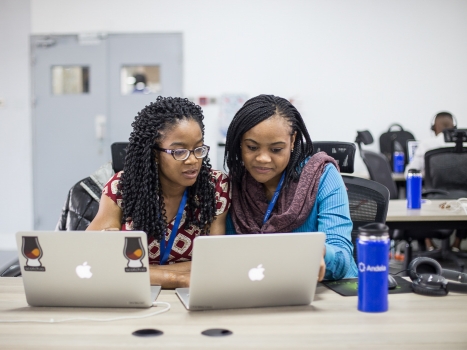
At Kwame Nkrumah University of Science and Technology, Angela Koranteng was an accomplished student with a special dream. At a time when few women were breaking the gender barrier in male-dominated studies, Ms. Koranteng had her heart set on health sciences—but instead of treating patients, she wanted to be an engineer and build hospitals.
After a round of courses in computer programming, civil engineering and coding, Ms. Koranteng today has earned a degree and a title: professional African coder.
Coding is what makes it possible to create computer software, apps and websites. Your browser, your operating system, the apps on your phone, Facebook, and websites—they’re all made with code. Coding can be learned at a university or boot camp.
Because boys are exposed to technical matters in childhood and girls are not, few young African women imagine themselves on a career track in engineering.
Not just a man’s field
In college, “I learned everything from scratch, whereas the boys already knew the basics,” Ms. Koranteng told Africa Renewal in an interview. That disadvantage ensured that “my contributions [in class] were deemed less intelligent than those of my male counterparts.”
Even Ms. Koranteng’s father was not sure that a path in coding was good for her. “He didn’t know that coding would become one of the most in-demand skills across industries,” she explained.
Today Ms. Koranteng works with a group called STEMbees, a Ghana-based nonprofit organization she helped to found, which mentors young women in STEM (science, technology, engineering and mathematics). Ms. Koranteng hopes that more girls in STEM will help bridge the gender gap in computing.
Unfortunately, training in STEM still attracts fewer women students than training in teaching, law, medicine or business.
Karen Spärck Jones, a professor of computers and information at the University of Cambridge Computer Laboratory in the UK, once said that “computing is too important to be left to men.”
But even in the most developed countries, the computer field is disproportionately dominated by men. In 2013 in the US, only 26% of computing professionals were female—down considerably from 35% in 1990 and virtually the same as in 1960. While the percentage of women in engineering has risen since 1990, the progress has been modest—from 9% in 1990 to 12% in 2013.
A 2012 US Department of Labor survey reported that women in the US comprised 30% of web developers, 25% of programmers, 37% of database administrators, 20% of software developers, and a little over 10% of information security analysts. Women also held less than 20% of chief information officer positions at Fortune 250 companies, and among the Fortune 100 tech companies, only four women held chief executive officer positions. At tech giants like Google, over 70% of technical employees were men.
Lacking reliable data, Ms. Koranteng presumes Africa’s situation to be far worse than that of the US. In the bustling Computer Village in Lagos, Nigeria, for example, it is mostly young men developing apps or engaging in other computing work, Caleb Ibhasabemon, who monitors technology trends and plans to start a computer hardware sales company, told Africa Renewal in an interview. Learn more
